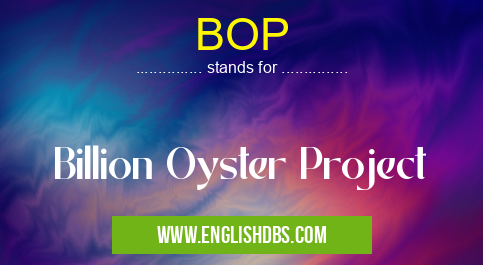What does BOP mean in UNCLASSIFIED
BOP stands for Billion Oyster Project, an award-winning non-profit organization based in New York City dedicated to restoring and enhancing the nature and habitat of the harbor by creating one billion live oysters over time. Founded in 2014, BOP works with partners to pursue its mission of regenerating a self-sustaining oyster population, as well as sharing knowledge about the need for ocean restoration with local schools and communities.

BOP meaning in Unclassified in Miscellaneous
BOP mostly used in an acronym Unclassified in Category Miscellaneous that means Billion Oyster Project
Shorthand: BOP,
Full Form: Billion Oyster Project
For more information of "Billion Oyster Project", see the section below.
What Does BOP Mean? As an acronym, BOP stands for Billion Oyster Project, a marine environmental initiative that seeks to restore a billion live oysters back into New York City’s Harbour through various initiatives, which include
collecting shells from restaurants and events; hosting educational activities at local schools; collaborating with partners on research studies; and building reef structures to house juvenile oysters. The goal of this project is to improve water quality in the harbour, create new habitats for native species and ultimately bring life back to a historically vital body of water.
The Benefits of BOP
The Billion Oyster Project has had numerous positive impacts on both the physical environment and social aspects of New York City’s waterfront. Physically, BOP is helping to restore a balanced ecosystem by introducing new life into it while simultaneously improving water quality. Studies have also shown that an increase in oyster density can reduce flood risks by acting as natural breakwaters during flooding events. Socially, the organization has helped engage local communities in understanding marine ecology while also providing jobs such as shell collectors which help support their families.
Essential Questions and Answers on Billion Oyster Project in "MISCELLANEOUS»UNFILED"
What is the Billion Oyster Project?
The Billion Oyster Project is a New York Harbor restoration project that works to restore one billion live oysters to the Harbour over the next 20 years. The project brings together volunteers, scientists, teachers, waterfront businesses, and communities to restore local ecosystems in order to improve water quality and create urban aquatic habitats.
Why should we care about oysters?
Oysters are essential components of healthy marine ecosystems because they filter and clean large amounts of water. They also provide habitats for fish and other organisms in the water. Furthermore, they can help protect coastal communities from storm surges by reducing wave heights when placed in clusters.
What areas does BOP work on?
BOP focuses its restoration efforts on public beaches around New York Harbor, including Governors Island, Ellis Island, Queens’ Rockaway Beach, Jamaica Bay Wildlife Refuge, and Staten Island’s Tottenville Shoreline.
How do you get involved with BOP?
There are many ways to get involved with BOP! You can volunteer at their restoration sites or join their virtual crew. You can also become a restaurant partner or join an upcoming event such as webinars or educational programming. Finally, you can make a donation that supports their mission of restoring healthy coastal ecosystems in NYC.
What do oyster reefs provide once established?
Once established, oyster reefs provide necessary habitat for many fish species which helps support fisheries in nearby areas. Furthermore, they act as natural filters that help clean our waterways by removing pollutants from runoff that enters the harbor through sewers and other sources. Additionally, these reefs will help protect coastlines from flooding associated with storms and rising sea levels due to climate change.
How does BOP monitor its restoration progress?
BOP measures its progress using both short-term and long-term environmental monitoring activities such as water quality testing and biodiversity surveys. Results from these measurements are key indicators of the success of their current projects as well as future planning efforts.
How has Covid-19 impacted BOP’s operations?
While Covid-19 has caused challenges for organizations across the world, it has also presented new opportunities for collaboration between private entities like restaurants or schools who now have access to new funding sources or additional resources during this time of economic uncertainty.
Can I donate my time to help out with BOP activities?
Absolutely! Volunteers are essential in helping us meet our restoration goals across our various sites throughout NYC. We have ongoing opportunities for adults and youth alike to join our virtual crew or work onsite at any of our beaches. Visit our website today for more information!
Final Words:
The Billion Oyster Project is one example of how science can be used to make meaningful environmental change in urban areas. To date it has been highly successful in its mission of restoring one billion live oysters into New York Harbor while inspiring other organisations around the country who are also looking to improve their local waterscapes through similar initiatives. With continued passion and dedication from its team members along with strong community support the potential contributions made by this project are limitless!
BOP also stands for: |
|
| All stands for BOP |
